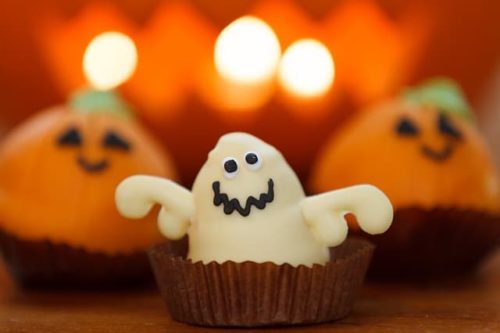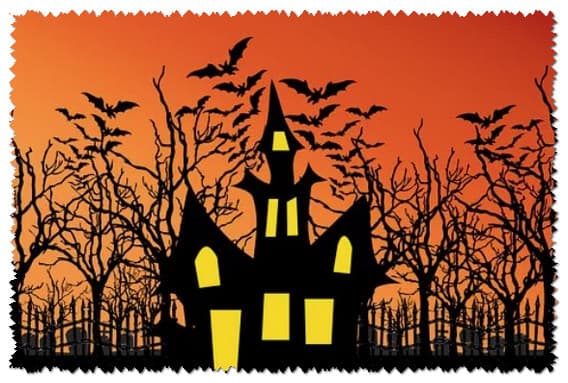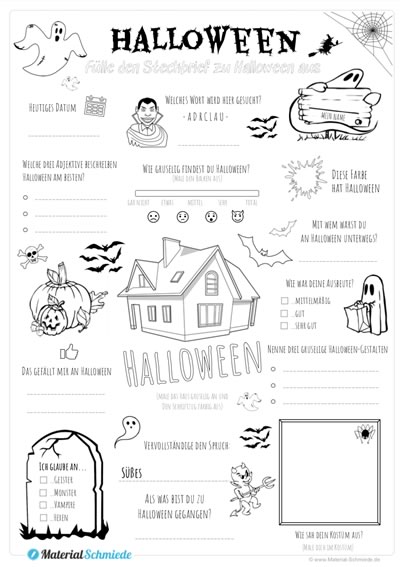
By
Last updated:
January 8, 2023
18 Essential German Words and Phrases for a Spooky Halloween
The season of falling leaves and nippy weather is here.
Coming soon is the holiday favored by lovers of tingling spines and sugary delights.
Yes, Halloween is just around the corner, and what with your diligent German studies and your interest in cool German vocabulary, you might want to spice up the holiday with a bit of Deutsch!
Maybe you’re going to be abroad in Germany around the autumn season and can witness the holiday in the flesh, or maybe you want to add some spooky flavor to your at-home self-studies.
No matter your reason, it’s always a great idea to broaden your word bank as much (and in as fun a way!) as possible, and checking out the special vocabulary used during certain holidays is a fantastic way to do so.
That said, you’re probably wondering… what’s German Halloween like?
Download:
This blog post is available as a convenient and portable PDF that you
can take anywhere.
Click here to get a copy. (Download)
How October 31st Works in Germany
For all of its cultural fascination with spooky stories, Germany doesn’t actually have a strong inclination to celebrate Halloween, as this is generally considered an American holiday.
There are a few Halloween-focused parties and events, often sponsored by a local community or done individually, such as horror movie fests and small-scale parades. You might see some young trick-or-treaters wandering the streets or adults participating in costume-themed festivities.
One of the usual excuses to celebrate is the fact that November 1st is Allerheiligen (All Saints’ Day), an actual religious holiday in Germany that can give some folks a reason to dress up the night before or shops to start selling some spooky gear.
However, amongst some Germans, there’s also the opinion that Halloween is an unwanted hassle upon existing and established German holidays that take place in the same season.
For example, Martinstag (Saint Martin’s Day), which is on November 11th, is a day hosting bonfire and lantern-carrying processions to celebrate the historical Saint Martin of Tours. There’s even an event quite similar to trick-or-treating, where children may receive treats while singing songs at doorsteps. This holiday is often cited to be a victim to the more commercialized Halloween.
Nevertheless, Halloween and its festivities appear to be growing in popularity in Germany, so there’s good reason to learn some vocabulary that’s commonly used on a German October 31st.
Without further ado, here’s our list of German vocab you’ll be wanting to use on the holiday of ghosts and ghouls.
Phrases
Frohes Halloween (Happy Halloween)
There isn’t a special German word for Halloween, so a simple Frohes Halloween is all that’s needed to wish someone a lovely, spooky day.
Froh by itself means “merry” and, in the correct gender case, can be tacked on to the beginning of a certain holiday for a celebratory greeting (for example, Frohe Weihnachten for “Merry Christmas”).
Süßes oder Saures! (Sweets or sours!)
The German equivalent to “Trick or treat!” and what candy-craving German children chime at doorsteps on Halloween. One can also say Süßes, sonst gibt’s Saures (“Sweets, or there will be sours”) to be slightly more menacing in their approach.
Vorsicht! (Beware!)
A good word to know whether it’s Halloween or not, as it can also just serve as a general warning of “Watch out!” If you want to be more specific, you can say Vorsicht vor ___ (“Beware of ___”).
Ruhe in Frieden (Rest in peace)
Naturally, as with the English R.I.P., you’ll also find this phrase on gravestones, although not shortened as R.I.F. as you might think!
Nouns
Der Jack O’ Lantern / Halloweenkürbis (jack o’ lantern)
The name “jack o’ lantern” and the practice of decorating candle-lit pumpkins derives from an Irish folktale and there isn’t a unique German word for it.
Der Halloweenkürbis literally just means “Halloween pumpkin.” There are actually a number of pumpkin-carving events in the German-speaking world, a popular one being the Kürbisfest in Retzer Land near Vienna.
Die Gruselgeschichte (scary story)
This word is a simple combination of the adjective gruselig (“creepy” or “horrifying”) and die Geschichte (“story”). Germany has its own tradition of eerie tales, so you’ll definitely want to hear some of them on Halloween night.
Der Alptraum / der Nachtmahr (nightmare)
Der Alptraum is a word derived from a combination of der Alb (“elf” or “goblin”) and der Traum (“dream”), as it was once believed that nightmares were caused by an elf sitting on your chest.
Der Nachtmahr comes from die Nacht (“night”) and der Mahr (which is essentially the same thing as der Alb), and the English word “nightmare” originates from this German word.
However, Nachtmahr is considered a bit outdated. Alptraum is more commonly used nowadays to describe those frightful dreams that haunt your sleep.
Die Fratze (grimace, ugly face)
No Halloween is complete without some horrific face-making. Die Fratze can mean your standard grimace or a grotesque face, either of which you’ll want to perfect for October 31st.
Das Kostümfest (costume party)
A staple of Halloween, costume parties have made their mark in German celebrations of the holiday. It’s also good to know that the Germans prefer to keep their attire fittingly scary for the occasion. If you’re going to attend one of their costume parties, you might want to switch out your Superman costume or cute animal suit for something truly frightening.
Der Aberglaube (superstition)
Germany has its own fair share of superstitious beliefs, and some may sound quite familiar (the fortune of four-leaf clovers being one such example). Aberglaube is a combination of an antiquated aber, which essentially meant “after” or “against,” and the word der Glaube, meaning “belief.” Thus, Aberglaube loosely means “against belief,” and is understood in context to mean “against Christian belief.”
Verbs
sich verkleiden (to dress up)
You’ll want to wear your spooky best for a German costume party on Halloween. Remember that this verb is a reflexive one, so don’t forget to use the proper sich form!
For example, if you’re going to a serious costume party that won’t take anyone slacking in their attire, you might hear:
Alle Gäste müssen sich verkleiden. (All guests must dress up.)
jemandem Streiche spielen (to play tricks on someone)
Playing tricks will always be a staple of any Halloween, even in Germany. The usual suspects will likely be some particularly mischievous youths.
naschen (to eat sweets)
Naschen can just mean “to nibble,” but it’s commonly used in reference to sweets consumption. There’s even an idiom, gerne naschen, that means “to have a sweet tooth.”
verfolgen (to haunt)
Verfolgen can also just mean “to follow” in a non-Halloween context. The verb spuken has a similar meaning to verfolgen and is more associated with the spooky, otherworldly kind of stalking.
Adjectives
spukhaft (spooky, ghostly)
The spuk part of this word (Der Spuk is a noun that means “haunting”) will be a pretty easy clue for English speakers as to what it means.
übernatürlich (supernatural)
A word that just rolls off the tongue. The adjective is a combination of über (“above” or “super”) and natürlich (“natural”), just like its English translation!
gruselig (scary)
This is a word you’ll be tossing around all day on Halloween. Gruselig is an adjective that can encompass varying levels of scary and can be used to describe something as just “creepy” to flat-out “horrifying.”
schauerlich (nightmarish, gruesome)
Der Schaeur can have a few different meanings, including “thrill,” “shiver” and “chill.” When this is combined with the general suffix -lich (the English equivalent being “-ish”), you get an adjective to help you describe something truly spine-tingling or unearthly.
So there’s our list of some fun and essential vocabulary for a German Halloween—see if you can put it to good use this upcoming October 31st.
We hope you have a safe and spook-tacular holiday!
Download:
This blog post is available as a convenient and portable PDF that you
can take anywhere.
Click here to get a copy. (Download)

By
Last updated:
January 8, 2023
18 Essential German Words and Phrases for a Spooky Halloween
The season of falling leaves and nippy weather is here.
Coming soon is the holiday favored by lovers of tingling spines and sugary delights.
Yes, Halloween is just around the corner, and what with your diligent German studies and your interest in cool German vocabulary, you might want to spice up the holiday with a bit of Deutsch!
Maybe you’re going to be abroad in Germany around the autumn season and can witness the holiday in the flesh, or maybe you want to add some spooky flavor to your at-home self-studies.
No matter your reason, it’s always a great idea to broaden your word bank as much (and in as fun a way!) as possible, and checking out the special vocabulary used during certain holidays is a fantastic way to do so.
That said, you’re probably wondering… what’s German Halloween like?
Download:
This blog post is available as a convenient and portable PDF that you
can take anywhere.
Click here to get a copy. (Download)
How October 31st Works in Germany
For all of its cultural fascination with spooky stories, Germany doesn’t actually have a strong inclination to celebrate Halloween, as this is generally considered an American holiday.
There are a few Halloween-focused parties and events, often sponsored by a local community or done individually, such as horror movie fests and small-scale parades. You might see some young trick-or-treaters wandering the streets or adults participating in costume-themed festivities.
One of the usual excuses to celebrate is the fact that November 1st is Allerheiligen (All Saints’ Day), an actual religious holiday in Germany that can give some folks a reason to dress up the night before or shops to start selling some spooky gear.
However, amongst some Germans, there’s also the opinion that Halloween is an unwanted hassle upon existing and established German holidays that take place in the same season.
For example, Martinstag (Saint Martin’s Day), which is on November 11th, is a day hosting bonfire and lantern-carrying processions to celebrate the historical Saint Martin of Tours. There’s even an event quite similar to trick-or-treating, where children may receive treats while singing songs at doorsteps. This holiday is often cited to be a victim to the more commercialized Halloween.
Nevertheless, Halloween and its festivities appear to be growing in popularity in Germany, so there’s good reason to learn some vocabulary that’s commonly used on a German October 31st.
Without further ado, here’s our list of German vocab you’ll be wanting to use on the holiday of ghosts and ghouls.
Phrases
Frohes Halloween (Happy Halloween)
There isn’t a special German word for Halloween, so a simple Frohes Halloween is all that’s needed to wish someone a lovely, spooky day.
Froh by itself means “merry” and, in the correct gender case, can be tacked on to the beginning of a certain holiday for a celebratory greeting (for example, Frohe Weihnachten for “Merry Christmas”).
Süßes oder Saures! (Sweets or sours!)
The German equivalent to “Trick or treat!” and what candy-craving German children chime at doorsteps on Halloween. One can also say Süßes, sonst gibt’s Saures (“Sweets, or there will be sours”) to be slightly more menacing in their approach.
Vorsicht! (Beware!)
A good word to know whether it’s Halloween or not, as it can also just serve as a general warning of “Watch out!” If you want to be more specific, you can say Vorsicht vor ___ (“Beware of ___”).
Ruhe in Frieden (Rest in peace)
Naturally, as with the English R.I.P., you’ll also find this phrase on gravestones, although not shortened as R.I.F. as you might think!
Nouns
Der Jack O’ Lantern / Halloweenkürbis (jack o’ lantern)
The name “jack o’ lantern” and the practice of decorating candle-lit pumpkins derives from an Irish folktale and there isn’t a unique German word for it.
Der Halloweenkürbis literally just means “Halloween pumpkin.” There are actually a number of pumpkin-carving events in the German-speaking world, a popular one being the Kürbisfest in Retzer Land near Vienna.
Die Gruselgeschichte (scary story)
This word is a simple combination of the adjective gruselig (“creepy” or “horrifying”) and die Geschichte (“story”). Germany has its own tradition of eerie tales, so you’ll definitely want to hear some of them on Halloween night.
Der Alptraum / der Nachtmahr (nightmare)
Der Alptraum is a word derived from a combination of der Alb (“elf” or “goblin”) and der Traum (“dream”), as it was once believed that nightmares were caused by an elf sitting on your chest.
Der Nachtmahr comes from die Nacht (“night”) and der Mahr (which is essentially the same thing as der Alb), and the English word “nightmare” originates from this German word.
However, Nachtmahr is considered a bit outdated. Alptraum is more commonly used nowadays to describe those frightful dreams that haunt your sleep.
Die Fratze (grimace, ugly face)
No Halloween is complete without some horrific face-making. Die Fratze can mean your standard grimace or a grotesque face, either of which you’ll want to perfect for October 31st.
Das Kostümfest (costume party)
A staple of Halloween, costume parties have made their mark in German celebrations of the holiday. It’s also good to know that the Germans prefer to keep their attire fittingly scary for the occasion. If you’re going to attend one of their costume parties, you might want to switch out your Superman costume or cute animal suit for something truly frightening.
Der Aberglaube (superstition)
Germany has its own fair share of superstitious beliefs, and some may sound quite familiar (the fortune of four-leaf clovers being one such example). Aberglaube is a combination of an antiquated aber, which essentially meant “after” or “against,” and the word der Glaube, meaning “belief.” Thus, Aberglaube loosely means “against belief,” and is understood in context to mean “against Christian belief.”
Verbs
sich verkleiden (to dress up)
You’ll want to wear your spooky best for a German costume party on Halloween. Remember that this verb is a reflexive one, so don’t forget to use the proper sich form!
For example, if you’re going to a serious costume party that won’t take anyone slacking in their attire, you might hear:
Alle Gäste müssen sich verkleiden. (All guests must dress up.)
jemandem Streiche spielen (to play tricks on someone)
Playing tricks will always be a staple of any Halloween, even in Germany. The usual suspects will likely be some particularly mischievous youths.
naschen (to eat sweets)
Naschen can just mean “to nibble,” but it’s commonly used in reference to sweets consumption. There’s even an idiom, gerne naschen, that means “to have a sweet tooth.”
verfolgen (to haunt)
Verfolgen can also just mean “to follow” in a non-Halloween context. The verb spuken has a similar meaning to verfolgen and is more associated with the spooky, otherworldly kind of stalking.
Adjectives
spukhaft (spooky, ghostly)
The spuk part of this word (Der Spuk is a noun that means “haunting”) will be a pretty easy clue for English speakers as to what it means.
übernatürlich (supernatural)
A word that just rolls off the tongue. The adjective is a combination of über (“above” or “super”) and natürlich (“natural”), just like its English translation!
gruselig (scary)
This is a word you’ll be tossing around all day on Halloween. Gruselig is an adjective that can encompass varying levels of scary and can be used to describe something as just “creepy” to flat-out “horrifying.”
schauerlich (nightmarish, gruesome)
Der Schaeur can have a few different meanings, including “thrill,” “shiver” and “chill.” When this is combined with the general suffix -lich (the English equivalent being “-ish”), you get an adjective to help you describe something truly spine-tingling or unearthly.
So there’s our list of some fun and essential vocabulary for a German Halloween—see if you can put it to good use this upcoming October 31st.
We hope you have a safe and spook-tacular holiday!
Download:
This blog post is available as a convenient and portable PDF that you
can take anywhere.
Click here to get a copy. (Download)
- Вы тут:немецкий
- стихи
уровень: для начинающих,
раздел: стихи
Внимание:
Настоятельно рекомендуем зарегистрироваться и войти под своим именем, тогда результаты будут сохранены, выученные слова будут
сохраняться в личном словаре, и можно будет их повторять!
Шаг 1
Словарный запас
Шаг 2
Тренажер слов
Словарный запас
осталось:

Выбери перевод из списка
выбери слово, которое является переводом, неправильные ответы исчезают
Установи соответсвие
найди пару слов в левом и правом столбце, если ответ верный, то оба слова исчезнут
Впиши перевод
прогресс: пока разминочка…
*если у вас возникают сложности и не получается понять текст, то воспользуйтесь онлайн переводчиком, просто выделите текст и нажмите появившуюся кнопку «перевести», но лучше сначала постараться перевести самим!
Halloween
Wenn wir um die Häuser ziehen
Dann ist Hu-Hu- Halloween!
Wollt Ihr uns nicht mit Süßem füttern
Werdet Ihr noch vor uns zittern!
Dann schleichen die Vampire
Hier um Eure Türe!
Dann klappern die Skelette
Schaurig um die Wette!
Dann geistern die Gespenster
Unter Eurem Fenster!
————————————
um die Häuser ziehen – ходить от дома к дому
Хэллоуин
Если мы ходим от дома к дому
Значит это Ху-Ху-Хэллоуин!
Не хотите нас кормить конфетами?
Будете дрожать перед нами!
Тогда крадутся вампиры
Сюда к вашим дверям!
Тогда идут громыхая скелеты
Жуткие (один другого страшнее)!
Тогда бредут призраки
Под ваше окно!
ziehen (zog, gezogen)
— тянуть, тащить
süß
— сладкий, милый
füttern
— кормить
zittern
— дрожать
schleichen (schlich, geschlichen)
— красться, подкрадываться
die Tür
— дверь
klappern
— греметь, стучать
das Skelett
— скелет
schaurig
— жуткий, ужасный
um die Wette
— наперегонки, на спор
geistern
— бродить как призрак
das Gespenst
— призрак, привидение
das Fenster (Fenster)
— окно
Social comments Cackle
Halloween
In der Nacht vom 31. Oktober zum 1. November feiern wir Halloween.
Häuser sind schaurig geschmückt und überall leuchten Kuerbisse.
Diese Kürbisfratzen sehen gruselig aus, weil sie die bösen Geister vertreiben sollen.
Der Name «Halloween» stammt von dem katholischen „Allerheiligen“ Fest ab.
Und «Halloween» ist die Abkürzung von dem englischen Fest „All Hallows Evening“.
Die alten Kelten glaubten, dass in dieser Zeit die Geister der Verstorbenen unsere Welt besuchen.
Die Kelten verkleideten sich so gruselig wie möglich, damit die Geist denkt sie wären bereits gestorben.
So wollten sie ihn überlisten, damit er sie nicht mit sich nahm.
Heutzutage verkleiden sich Kinder und Erwachsene und amüsieren sich gut.
Sie ziehen von Tür zu Tür um Süßigkeiten zu bekommen oder Streiche zu spielen.
Obwohl das Fest ursprünglich aus Europa stammt, Halloween ist sehr beliebt in den USA.
-
von Tür zu Tür
от двери к двери -
amüsieren sich gut
вовсю развлекаются -
so gruselig wie möglich
как можно страшнее -
die Geister der Verstorbenen
духи умерших -
Die alten Kelten
Древние кельты -
stammt von
происходит от -
bösen Geister
злые духи -
leuchten Kuerbisse
светящиеся тыквы -
schaurig geschmückt
устрашающе украшенный -
Streiche zu spielen
шалить
Хеллоуин
Показать интерактивный перевод
В ночь с 31 октября на 1 ноября мы празднуем Хеллоуин.
Устрашающе декорированные дома, везде светятся тыквенные головы.
Эти тыквенные гримасы выглядят устрашающе, потому что они должны отгонять злых духов.
Название «Хэллоуин» происходит от празднования католического дня «Всех Святых».
А «Halloween» — это аббревиатура английского праздника All Hallows Evening.
Древние кельты считали, что именно в это время духи умерших посещают наш мир.
Кельты одевались как можно страшнее, чтобы призрак думал, что они уже умерли.
Так они хотели перехитрить его, чтобы он не взял их с собой.
В наши дни дети и взрослые переодеваются и вовсю развлекаются.
Они бродят от двери к двери, чтобы получить конфеты или пошалить.
Хотя праздник имеет европейские корни, Хэллоуин очень популярен в США.
Рейтинг слов
артикли
союзы
предлоги
все
служебные слова
Добавить в список
Слушайте и повторяйте
Hören Sie zu und wiederholen Sie bitte
Слушайте и вспоминайте текст
Hören Sie zu und erinnern Sie sich
Выберите слова для изучения
Wählen Sie Wörter zu lernen
Что подходит?
Was passt?
Верно-неверно
Richtig oder falsch?
Впишите пропущенные буквы
Ergänzen Sie die fehlenden Buchstaben
Заполните пробелы
Ergänzen Sie
Соедини две части
Составьте предложение
Ordnen Sie die Wörter
Показать перевод
Заполните пробелы
Ergänzen Sie
Статистика урока
Ergänzen Sie
 В ночь с 31 октября на 1 ноября открывается дверь в потусторонний мир, и души мертвых выходят к людям… Сегодня Германия празднует Хеллоуин!👻
В ночь с 31 октября на 1 ноября открывается дверь в потусторонний мир, и души мертвых выходят к людям… Сегодня Германия празднует Хеллоуин!👻
Ну а мы с вами разберем лексику, идеально подходящую к этому празднику.
🎃 das Halloween — хеллоуин
🎃 der Kürbis — тыква
🎃 der Geist — привидение
🎃 die Drude, die Hexe — ведьма
🎃 der Blutsauger — вампир
🎃 die Spinne — паук
🎃 die Fledermaus — летучая мышь
🎃 die Mumie — мумия
🎃 das Gebein — кости, скелет
🎃 die Kerze — свеча
🎃 der Tod — смерть
🎃 das Rätselraten — гадание
🎃 Angst haben vor + Dativ — бояться чего-либо
🎃 die Bezauberung — колдовство
🎃 das Kostümfest — маскарад
🎃 der Zaubertrank — зелье
🎃 der Vorabende von Allerheiligen — канун всех Святых
🎃 der Werwolf — оборотень
🎃 die Leiche — труп
🎃 die Bewirtung — угощение
🎃 der Arge — нечистая сила
🎃 böse Geister — нечисть
🎃 sich verstellen + Akk — притворяться
🎃 schreien — кричать
🎃 aufbrüllen — вопить
🎃 ängstigen — пугать
🎃 sich verstecken — прятаться
🎃 in tausend Ängsten schweben — умереть от страха
🎃 verhexen — заколдовать
🎃 entsetzen — приводить в ужас
🎃 erschrecken zu Tode — напугать до смерти
🎃 Ärger krabbeln — щекотать нервы
⠀
✅ Кстати, одна из самых лучших локаций для праздника в Германии — замок Франкенштейна в Дармштадте.
Он привлекает в ночь на 1 ноября толпы людей, переодетых в костюмы монстров. А местные жители верят в то, что именно в эту ночь приведение хозяина бродит по крыше замка.
Мы подготовили для вас еще больше полезных материалов о лексике и грамматике немецкого языка! Подписывайтесь на рассылку, чтобы получать новые статьи в числе первых! А так же записывайтесь на пробный урок — наши преподаватели помогут вам заговорить на немецком и подготовиться к нужным экзаменам!
На основании Вашего запроса эти примеры могут содержать грубую лексику.
На основании Вашего запроса эти примеры могут содержать разговорную лексику.
Перевод «С Хэллоуином» на немецкий
Happy Halloween
Fröhliches Halloween
И тебя тоже с Хэллоуином.
Откуда ты думаешь пришли все эти идеи с Хэллоуином?
Только не говори, что у тебя проблемы с Хэллоуином и искусством?
Sag nicht, du hast ein Problem mit Halloween und Kunst.
Корни праздника, как и Рождества с Хэллоуином, восходят к языческим временам.
Wie Halloween und Weihnachten… hat der 1. April heidnische Wurzeln.
Это связано с Хэллоуином.
Клэр очень занята на работе в этом году, так что я взял на себя хлопоты с Хэллоуином.
Claire muss dieses Jahr arbeiten, also übernehme ich die Halloween-Aufgaben.
Результатов: 8. Точных совпадений: 8. Затраченное время: 15 мс
| HAPPY HALLOWEEN контекстный перевод и примеры — фразы |
|
|---|---|
| HAPPY HALLOWEEN фразы на немецком языке |
HAPPY HALLOWEEN фразы на русском языке |
| Happy Halloween | Веселого Хэллоуина |
| Happy Halloween | с Хэллоуином |
| Happy Halloween | Счастливого Хеллоуина |
| Happy Halloween | Счастливого Хэллоуина |
| HAPPY HALLOWEEN контекстный перевод и примеры — предложения |
|
|---|---|
| HAPPY HALLOWEEN предложения на немецком языке |
HAPPY HALLOWEEN предложения на русском языке |
| Happy Halloween! | С днем Хэллоуина! |
| Happy Halloween. | С Хэллоуином вас! |
| Happy Halloween! | Счастливого Хэллоуина! |
| — Happy Halloween, Kinder. | Счастливого Хэллоуина, дети! |
| Happy Halloween! | Счастливого Хэллоуина. |
| Happy Halloween, Mann. Entspann dich mal. | Счастливого Хэллоуина. |
| «Happy Halloween.» | «Счастливого Хеллоуина» |
| — Happy Halloween, Synecdoche. | Веселого Хэллоуина, Скенектади. |
| Happy Halloween. | Счастливого Хэллоуна! |
| Ich hasse es, meinen Lauf zu unterbrechen, aber «Happy Halloween«, ihr Verrückten! | Ненавижу заканчивать, когда я только разошёлся но счастливого хэллоуина, безумцы! |
| Nein… TESSA: Happy Halloween. | Кошелек или жизнь, лузеры? |
| Happy Halloween, George. | Веселого Хэллоуина, Джордж. |
| — Oh. Happy Halloween! | Веселого Хэллоуина! |
| Ha, ha, ha. Happy Halloween. | Веселого Хэллоуина! |
| Happy Halloween. | Счастливого Хэллоуина! |
| Happy Halloween. | — Счастливого Хэллоуина! |
| Happy Halloween! | Счастливого Хеллоуина. |
| Happy Halloween! Ich habe leckere Donuts! | Я принесла пончики. |
| Happy Halloween. | Весёлого Хэллоуина. |
| Denn, Happy Halloween. | Тогда, весёлого Хэллоуина. |
| Happy Halloween. | Счастливого Хэллоуина. |
| «Happy Halloween.» | «Счастливого Хеллоуждества». |
| Happy Halloween. | С праздником! |
| Happy Halloween! | Счастливого Хеллоуина! |
| Auch dir Happy Halloween. | И тебя тоже с Хэллоуином. |
| Ha, ha, Happy Halloween. | Ха-ха, с Хэллоуином. |
| In Ordnung, Happy Halloween. | Ну хорошо, счастливого Хэллоуина. |
| — Happy Halloween. — Das wünsche ich dir auch, | — С Днем Всех Святых. |
| Happy Halloween. | С Хеллоуином. |
Kostenloses Unterrichtsmaterial rund um Halloween
Halloween Unterrichtsmaterial
Kostenlose Arbeitsblätter zum Thema Halloween zum Herunterladen als PDF und zum Ausdrucken.
Halloween ist eigentlich ein „Fest“ aus den USA, wird inzwischen aber auch immer häufiger in Deutschland „gefeiert“. Halloween benennt dabei die Volksbräuche am Abend und in der Nacht vor dem Fest Allerheiligen – immer vom 31. Oktober auf den 1. November.
Halloween hat ganz bestimmte Bräuche und Traditionen. So gehen viele Kinder abends verkleidet durch die Straßen, klopfen an die Türen und rufen „Süßes oder Saures“ und erwarten meist eine Gabe in Form von Süßigkeiten. Aber auch in den Schulen gibt es inzwischen immer mehr Halloween-Feste, die oft mit Verkleidungen und Tätigkeiten wie „Basteln“ und/oder „Kürbis schnitzen“ in Verbindung stehen.
Wir stellen euch hier passendes Unterrichtsmaterial zu Halloween kostenlos zur Verfügung, dass ihr euch einfach herunterladen, ausdrucken und im Unterricht in Vorbereitung auf Halloween verwenden könnt.
Lernziele
- Hintergrundwissen zum „Fest“ Halloween erlangen
- Sich mit Traditionen und Bräuchen zu Halloween befassen
- Spielerische Aufgaben zu Halloween bearbeiten und lösen
ANZEIGE
Steckbrief Halloween
Unseren Steckbrief rund um das Thema Halloween mit Fragen und Bildchen zum Ausmalen findet ihr direkt bei der MaterialSchmiede.
Arbeitsblätter und Übungen zu Halloween
Verschiedene Arbeitsblätter zu Halloween
Malübungen zu Halloween
Ausmalbilder zu Halloween
Bastelübungen zu Halloween
ANZEIGE*
Empfehlungen zu Halloween
Folgende Empfehlungen zu Halloween möchten wir euch mit auf den Weg geben, welche ihr über Amazon erwerben könnt.
- Halloween Deko für das Klassenzimmer
- Lernwerkstatt Hexen und Halloween
- 144 temporäre Halloween Tattoo Aufkleber Für Kinder (Leuchten im Dunkeln)
- Halloween Superhelden Kostüme für Kinder











